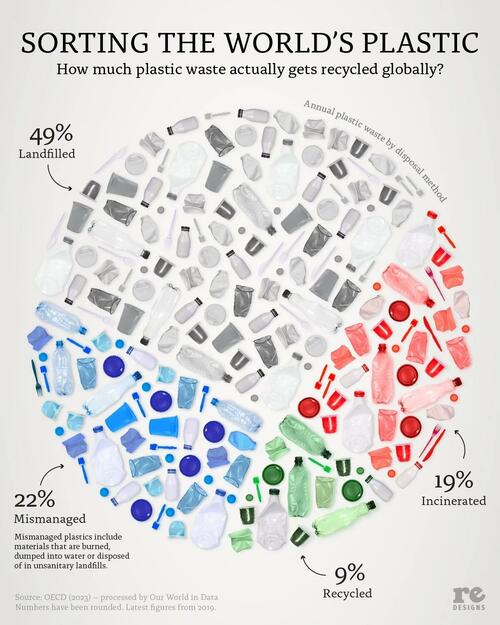The United States, the world’s largest plastic polluter, recycles a mere 5% of its household plastic waste.
Around the world, the situation is slightly better, but a staggering 91% of plastic waste is still incinerated, landfilled, or mismanaged (e.g. dumped into the ocean).
As Visual Capitalist's Nick Routley details below, the graphic below, by Rosey Eason, using OECD data (via Our World in Data), paints a clear picture of the situation. Here’s a global overview of how plastic waste is disposed of:
There is growing awareness of the world’s plastic waste challenges, so why isn’t that translating into higher rates of recycling?
The Illusion of Recycling
The recycling system itself is deeply flawed. Most plastics are incompatible, making sorting costly and inefficient. Only PET (#1) and HDPE (#2) are widely recycled. In short, once most plastic products are created and reach the end of their usefulness, they’re tough to repurpose.
The economics of recycling are also stacked against success. Virgin plastic, often subsidized by fossil fuel subsidies, is cheaper than recycled plastic. This price disparity discourages the use of recycled materials.
Furthermore, the rise of flexible packaging—those lightweight packets for snacks and food—exacerbates the problem. These multi-layered packets, while convenient, are incredibly difficult to recycle due to contamination and complex composition.
What Can Be Done About Plastic Waste?
Addressing the global plastic crisis requires systemic change. Here are some steps that could help stem the tide of plastic waste:
-
Bans on single-use and/or unrecyclable plastics
-
A global plastics treaty
-
Phasing out fossil fuel subsidies
-
Implementing and strengthening responsibility programs for plastic producers
Our day-to-day experience of using cheap and convenient plastics often supersedes any negative externalities that happen further down the chain. Solving the problem will require a fundamental shift in our relationship with plastic, driven by policy and innovation.
